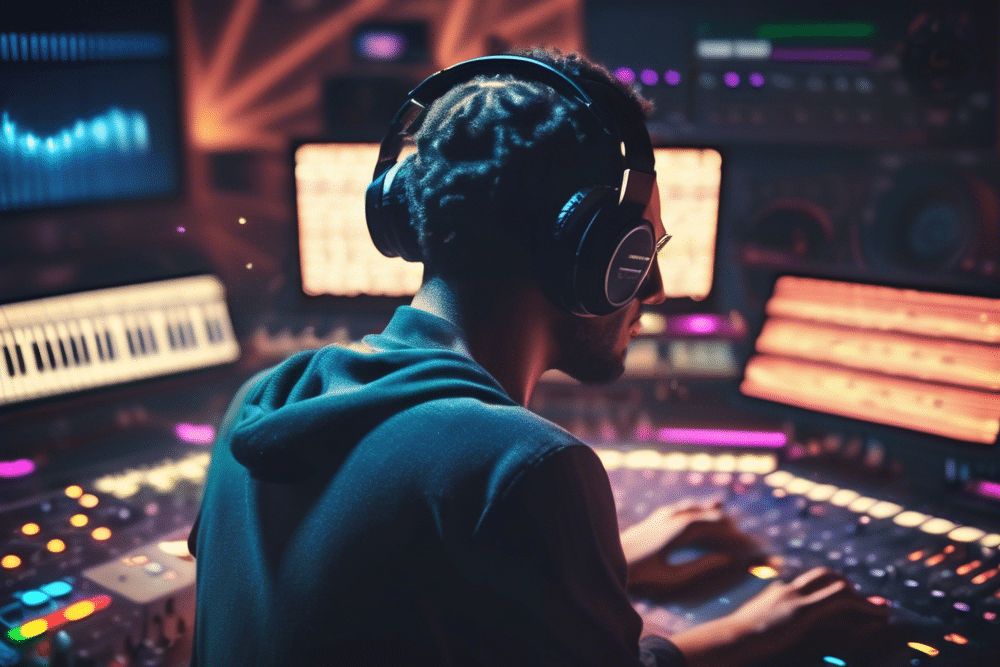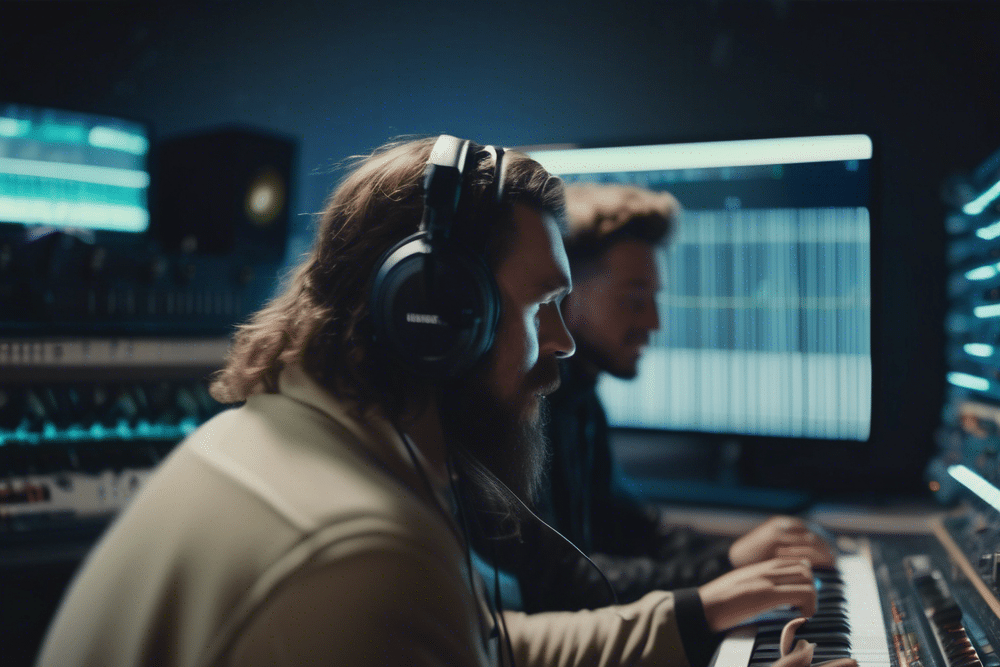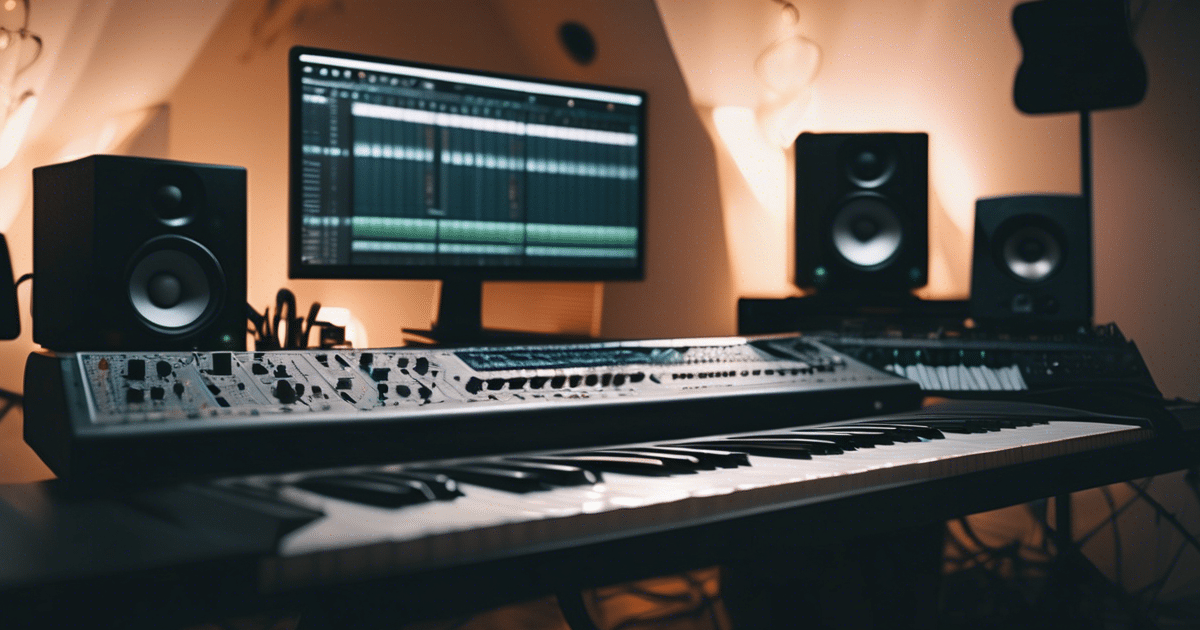Estimated reading time: 9 minutes
Introduction: The Journey to Musical Excellence
Have you ever found yourself tapping your foot to a catchy beat, humming along to a melody, or feeling moved by a powerful chord progression? If so, you’re not alone. Music has an incredible ability to touch our souls and ignite our creativity. For those of us who have taken the leap into music production, we know that creating music is both an art and a science. It’s a journey of continuous learning, experimentation, and growth.
Whether you’re just starting out or you’ve been producing music for years, there’s always room for improvement. In this comprehensive guide, we’ll explore various strategies and techniques to help you get better at making music. From honing your skills with music production software to understanding the nuances of sound engineering, we’ll cover it all. So, let’s dive in and discover how you can take your music production skills to the next level!
Table of contents
- Introduction: The Journey to Musical Excellence
- Mastering the Basics: Building a Strong Foundation
- Harnessing Technology: Leveraging Music Production Software
- Crafting Your Sound: Music Production Techniques
- Setting Up Your Space: Home Studio Essentials
- Collaboration and Networking: Learning from Others
- Staying Inspired: Nurturing Your Creativity
- Video: How to Get Better at Making Music
- Conclusion: Your Path to Musical Mastery
- FAQs
Mastering the Basics: Building a Strong Foundation
Understanding Music Theory
One of the most crucial steps in becoming a better music producer is developing a solid understanding of music theory. While it’s true that many successful producers have created hit songs without formal training, having a grasp of music theory can significantly enhance your abilities and open up new creative possibilities.
- Learn scales and chord progressions
- Understand rhythm and time signatures
- Study melody and harmony
- Explore different musical genres and their characteristics
By investing time in learning music theory, you’ll develop a deeper understanding of how music works. This knowledge will help you make more informed decisions when composing, arranging, and mixing your tracks.
Developing Your Ear
A keen ear is perhaps a music producer’s most valuable asset. Training your ear to recognize different frequencies, identify subtle nuances in sound, and pick up on the intricacies of various instruments will greatly improve your music-making abilities.
- Practice active listening to a wide variety of music
- Try to identify individual instruments in complex arrangements
- Pay attention to how different elements of a song interact with each other
- Experiment with ear training exercises and apps
Remember, developing your ear is an ongoing process. The more you listen critically, the better you’ll become at identifying what makes a great track and how to recreate those elements in your own music.
Harnessing Technology: Leveraging Music Production Software
In today’s digital age, music production software plays a crucial role in the creative process. Familiarizing yourself with different Digital Audio Workstations (DAWs) and virtual instruments can significantly enhance your music-making capabilities.
Choosing the Right DAW
There are numerous DAWs available, each with its own strengths and workflow. Some popular options include:
The key is to find a DAW that suits your working style and musical goals. Don’t be afraid to try out different options before settling on one. Many DAWs offer free trials, allowing you to explore their features before making a commitment.
Mastering Virtual Instruments and Plugins
Virtual instruments and plugins are powerful tools that can expand your sonic palette and add depth to your productions. Take the time to explore and master the various virtual instruments and effects plugins available in your chosen DAW.
- Experiment with different synthesizers to create unique sounds
- Learn how to use samplers effectively
- Explore effect plugins like EQ, compression, and reverb
- Discover creative ways to use plugins to shape your sound
Remember, while having access to a wide range of virtual instruments and plugins is great, it’s more important to deeply understand and effectively use a few key tools rather than having a superficial knowledge of many.

Crafting Your Sound: Music Production Techniques
Now that we’ve covered the basics and technology, let’s dive into some specific music production techniques that can help you improve your skills and develop your unique sound.
Arrangement and Composition
A well-arranged track can make the difference between a good song and a great one. Here are some tips to improve your arrangement skills:
- Start with a strong foundation: focus on creating a solid rhythm section
- Build tension and release throughout your track
- Use contrast to create interest and keep listeners engaged
- Pay attention to the overall structure of your song (intro, verse, chorus, bridge, etc.)
Mixing and Sound Engineering Basics
Mixing is where your track really comes to life. It’s the process of balancing and blending all the individual elements of your song to create a cohesive whole. Here are some key aspects to focus on:
- EQ: Learn how to use equalization to create space for each element in your mix
- Compression: Understand how to use compression to control dynamics and add punch to your tracks
- Panning: Use stereo placement to create width and depth in your mix
- Effects: Learn how to use reverb, delay, and other effects to add dimension to your sound
Creating a Signature Sound
Developing your own unique sound is crucial for standing out in the crowded music industry. Here are some ways to work towards finding your signature sound:
- Experiment with unconventional sound sources and recording techniques
- Combine different genres and styles in unexpected ways
- Develop your own production techniques and workflows
- Stay true to your musical influences while pushing boundaries
Remember, finding your signature sound is a journey, not a destination. It will evolve as you grow as a producer, so don’t be afraid to experiment and take risks.
Setting Up Your Space: Home Studio Essentials
Having a well-set up home studio can significantly impact the quality of your productions. While you don’t need to break the bank, investing in some key equipment can make a big difference.
Essential Equipment
- A good quality audio interface
- Studio monitors or high-quality headphones
- A MIDI controller
- A decent microphone (if you plan on recording live instruments or vocals)
Room Treatment
Even with the best equipment, your room’s acoustics can greatly affect the sound of your productions. Consider these basic room treatment techniques:
- Use acoustic panels to absorb reflections
- Place bass traps in corners to control low frequencies
- Position your monitors correctly for optimal listening
- Create a dedicated workspace free from distractions
Remember, a well-treated room doesn’t have to be expensive. There are many DIY solutions that can significantly improve your room’s acoustics.
Collaboration and Networking: Learning from Others
Music production doesn’t have to be a solitary pursuit. Collaborating with other producers and musicians can be an excellent way to improve your skills and gain new perspectives.

Finding Collaboration Opportunities
- Join online music production communities and forums
- Attend local music events and meetups
- Reach out to other producers whose work you admire
- Participate in remix contests or collaborations
Learning from Feedback
Receiving constructive feedback on your work is crucial for growth. Here’s how to make the most of it:
- Share your work with other producers and ask for specific feedback
- Be open to criticism and use it as a learning opportunity
- Analyze tracks you admire and try to understand what makes them effective
- Consider taking online courses or workshops to learn from experienced producers
Remember, every successful producer was once a beginner. Don’t be afraid to put yourself out there and learn from others in the community.
Staying Inspired: Nurturing Your Creativity
Creating music consistently requires a constant source of inspiration. Here are some ways to keep your creative juices flowing:
- Listen to a wide variety of music, including genres outside your comfort zone
- Take breaks and engage in other creative activities (drawing, writing, etc.)
- Keep a notebook or voice recorder handy to capture ideas when inspiration strikes
- Set aside dedicated time for experimentation and play without the pressure of creating a finished track
Overcoming Creative Blocks
Every producer faces creative blocks from time to time. Here are some strategies to overcome them:
- Change your environment: work in a different location or at a different time of day
- Impose limitations: try creating a track using only a limited set of tools or sounds
- Collaborate with others to get fresh ideas and perspectives
- Take a break and come back to your project with fresh ears
Remember, creativity is like a muscle – the more you exercise it, the stronger it becomes.
Video: How to Get Better at Making Music
Conclusion: Your Path to Musical Mastery
Becoming a better music producer is a lifelong journey of learning, experimentation, and growth. By focusing on developing your skills in music theory, ear training, technology, production techniques, and creativity, you’ll be well on your way to creating music that truly resonates with listeners.
Remember, there’s no one-size-fits-all approach to music production. What works for one producer might not work for another. The key is to stay curious, keep experimenting, and never stop learning. Whether you’re tweaking synthesizer patches, arranging complex harmonies, or mixing your latest track, approach each task with enthusiasm and a willingness to push your boundaries.
As you continue on your musical journey, don’t forget to enjoy the process. Making music should be fun and fulfilling. Celebrate your successes, learn from your mistakes, and always strive to express your unique creative voice through your music.
So, what are you waiting for? Fire up your DAW, put on your headphones, and start creating. Your next great track is waiting to be born!
Related Posts
FAQs
Developing a solid understanding of music theory, honing your ear through active listening, and getting comfortable with your DAW are essential starting points.
Experiment with different Digital Audio Workstations (DAWs), watch tutorials, practice regularly, and master a few key virtual instruments and plugins to build efficiency and creativity.
Music theory helps you understand scales, chord progressions, and harmonies, allowing you to create more engaging melodies and better arrangements.
Experiment with unconventional sound sources, combine diverse genres, and refine your production techniques until you find a style that represents your creative voice.
Invest in quality equipment such as an audio interface, studio monitors or headphones, a MIDI controller, a decent microphone, and consider basic room treatment to optimize acoustics.
